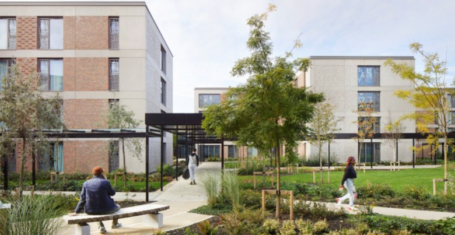
Your guide to managing social anxiety as a student
How to not let it stop you ordering that drink
Being a student who suffers from social anxiety means having to deal with an extra, ever-present element of stress in the most mundane situations. Ordering drinks, meeting new people, and speaking in seminars feels impossible. Not to mention the already existing challenges of deadlines, work, chores, budgeting and so on. This is the reality for so many of us.
Social anxiety is defined by the National Institute for Health and Clinical Excellence as: "an anxiety disorder characterised by a significant amount of fear in one or more social situations, causing considerable distress and impaired ability to function in at least some parts of daily life".
It meant, for me, being incredibly excited but also incredibly apprehensive on my first day of university; I would be living on my own for the first time ever – and I would have to interact with new people, a lot of them, all the time. Sheltering myself from the world wouldn't work anymore.
Fast forward to now, I'm in my second year and although my social anxiety is still very much present, I've learnt to control it and work around it.
If you haven't sought professional advice, spoken to your doctor, or looked into your university's available counselling services yet, here are some alternative ways of coping with social anxiety at university.
Acceptance
People with social anxiety have been called everything from "quiet" to "antisocial"; with the implication that our feelings are just a character trait or not actually serious, because the lack of mental health awareness means that social anxiety is not recognised as a legitimate disorder. Once you acknowledge that you have a real problem, and that it is absolutely not anything to be ashamed of but is affecting your life negatively, you can work towards solving it.
Reaching out

This is much easier said than done, but nothing gave me more relief than when I opened up to my friends at university about my anxiety and they understood me. No judgement or accusations of "just shyness" from them; I'm much less on edge and I can fully be myself, and enjoy myself, when I'm with them. You are never alone, and it's so important to have a support network of friends, family or loved ones to lean on and ask for advice/assistance when you need it. I highly recommend telling someone you trust about your anxiety, no matter how silly or trivial it may seem.
Having a genuine desire to get better
For so many years, including my first year at university, I just accepted that my anxiety was there, without doing anything about it. I missed out on so many experiences, friendships and memories because I'd just avoid the source of my anxiety – people and social situations – at all costs.
Then recently, I decided I can't keep being passive and letting my social anxiety take over. If I don't do something about it now, during my student years, I'll miss out on even more opportunities. Just having the motivation to improve works wonders – you have to give yourself that push and just go for it. Ride that impulse and do the thing that freaks you out – starting a new internship or talking to a new person, for example – before you can overthink it, because it may make you severely uncomfortable for a bit, but you'll only improve by challenging yourself.
Distractions
Doing something else in the midst of uncomfortable social situations or just while being in public really helps take your mind off your social anxiety. Reading books, listening to music, catching up with the news, spending time with animals, texting or calling, checking social media and so on can all contribute. For example, listening to calming, mellow music eases my nerves when I go grocery shopping. While this may be perceived as rude or careless by some people, your comfort and mental health is always most important, so feel free to do whatever gives you relief – just always remember to be aware of your surroundings.
Having alone time and resting

Being around people constantly and having to engage with them in so many different ways can be exhausting for someone with social anxiety. Whether it's using a free hour between classes to relax at a cafe or spending a whole day watching Netflix in your room, it's very important to find time to yourself, to recharge your batteries and just give yourself a break. Don't force yourself to go out with your friends if you don't feel up for it, either. Self-care and quality time in your own company beats any forced social interactions.
Natural remedies
CBD (cannabidiol) is a naturally occurring chemical found in cannabis/hemp plants. It's not psychoactive at all, so no, it will not get you high. But it is 100 per cent legal and has significant anti-anxiety properties, as well as being proven to be effective in reducing social anxiety , with a much lower incidence of side effects.
CBD oil is calming and will ease symptoms such as irrational fear/self-consciousness. Using the right amount, like just before an intimidating presentation or social situation, works amazingly.









































